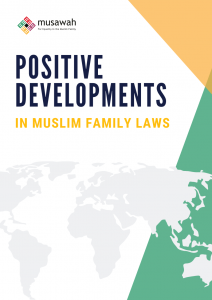Since 2012, Musawah has been researching Muslim family laws and practices that enforce de jure and de facto discrimination against women in various Muslim majority and minority countries. Our report on CEDAW and Muslim Family Laws tracked CEDAW compliance in addressing discriminations against Muslim women on family law matters in 44 different countries. Through Musawah’s work in international advocacy, capacity building and knowledge building, a strong need to map out and track positive developments in Muslim family laws globally emerged.
In 2016 we began compiling information outlining the legislative frameworks, available case law, policies, procedures and practices in 31 countries (and counting) along 12 principal issues of concern we have identified. The country overview tables, downloadable below, were prepared in consultation with national advocates and experts and are still works-in-progress given the diverse and evolving nature of law reform globally. A review of positive developments in Muslim family laws globally is now available in English and Arabic.
Positive Developments & Country Overview Tables
To select the country overview table for a specific country, search among the countries available listed in the sidebar on the left, or click on the map.
The initiative also tracks reform and positive developments in Muslim family laws globally, with an overview of legislative frameworks, available case law, policies, procedures and practices in the 12 principal issues of concern. The Positive Developments in Muslim Family Laws tables are available in English and Arabic.
The diversity of provisions and practices in Muslim family laws across the world and the ongoing process of reform of these laws in multiple countries, demonstrates that change towards more egalitarian family laws which guarantee equality and justice to Muslim women and men, is both necessary and possible.
12 Principal Areas of Concern
Equality of Spouses in Marriage
Women's Consent to Marriage
Women's Capacity to Enter Marriage
Polygamous Marriage
Divorce Rights
Child Marriage
Women's Financial Capacity After Divorce
Custody of Children
Guardianship of Children
Inheritance Rights
Violence Against Women (In Family)
Nationality Rights
As this is an ongoing initiative, we invite feedback and any verification of information, as well as submission of any additional information and updates on the countries listed. We plan to begin visually mapping global facts, trends and information on Muslim family laws and will be updating our website accordingly. Please email us at musawah (at) musawah.org to get in touch and/or discuss collaborative ways of using this information.
Contents of the ‘Positive Developments in Muslim Family Laws’ and country overview tables are licensed under a Creative Commons Attribution 4.0 International license.

